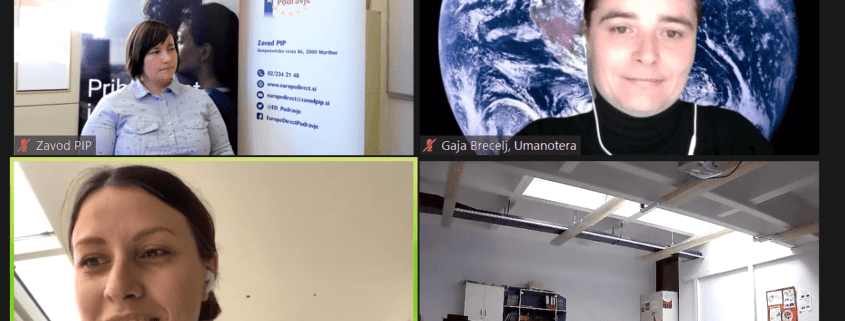On Monday, 6 December 2021, MEP Irena Joveva participated in an online debate “What does a green and digital future bring for young people?” organised by the Zavod PIP institute and the Europe Direct Podravje information point. During the debate, the speakers focused on the climate change situation in Slovenia, the impact of the pandemic on the environment, the exit from the COVID-19 crisis supported by the digital and green transitions, the actions outlined in the recovery plans launched at the EU and national levels and, last but not least, on what all this means for the future of young Europeans.
The transition to a climate-neutral society is both a challenge and an opportunity to create a better future for all. In her introduction, Irena Joveva explained that the European Union has adopted ambitious legislation to implement its climate change commitments — the European Green Deal, a flagship strategy that provides a roadmap and a timeline for the Union to deliver on its climate ambitions. “It is a strategy to increase resource efficiency by moving to a clean, circular economy, restoring biodiversity and reducing pollution.” The MEP explained to the young audience that the EU intends to cut greenhouse gas emissions by at least 55% by 2030 compared to 1990 levels, and that it is committed to becoming the first carbon-neutral continent by 2050. “The European Green Deal will also be a lifeline for the post-COVID-19 recovery. Together with the Recovery and Resilience Fund, the measures support a sound economic recovery and development in a green and digital direction.” Still, these are only frameworks and recommendations, said the MEP, adding that everything depends on how strategically Member States manage to put to use the financial assistance and loans and contribute to these transitions. In her view, the green and digital transitions are taking place in parallel and both will have major implications for the future of work and for our systems. “But the two transitions are also fundamentally different, since in the Member States in particular or in the governments’ spending plans a varying sense of urgency can be observed related to their pursuit and implementation. Digitalisation is part of the environmental solution and not part of the problem. Digitalisation can be used to increase energy efficiency, optimise energy management and combine centralised and decentralised approaches.” At the same time, the MEP expressed concern, shared by experts, that smart batteries and waste from renewable energy power plants also need to be deposited somewhere.
The young participants were particularly interested in what the planned Digital Decade will bring for the future of Europe and the young. Joveva explained that Europe’s Digital Decade is a vision and path for the continent’s digital transformation by 2030. “The Digital Compass for the EU’s Digital Decade is based on four cardinal points: skills, safe and sustainable digital infrastructure, digital transformation of businesses and digitalisation of public services, notably e-health and the digital identity of all Union citizens.” One of the principles proposed in the European Commission’s Communication on the 2030 Digital Compass is the protection and empowerment of children and young people in the online space. Children and young people should be equipped with digital literacy and the necessary skills and competences to navigate safely and responsibly online from a very young age and throughout education and training. “Every child must be protected from harmful and illegal content. We have already paid considerable attention to these issues in Parliament when drafting the Digital Services Act (DSA) and the Digital Markets Act (DSA), where I also participated as shadow rapporteur.”
In the follow-up to the debate, Joveva also outlined the opportunities the European Union offers to young people. The most familiar is the Erasmus+ study exchange programme, but there are other options as well. “Within the framework of formal education there are furthermore transnational cooperation programmes such as the CEEPUS regional programme, and in addition there are non-formal education options, ranging from volunteering (European Voluntary Service and European Solidarity Corps) to job search opportunities (EURES network, placements within Erasmus+, traineeships in the EU institutions, ALMA) and various European projects and competitions.”
In addition to Joveva, Nives Felić, youth worker from the Zavod Nefiks institute, and Gaja Brecelj, director of Umanotera and Slovenian #EUClimatePact Ambassador took part in the hybrid debate.





Leave a Reply
Want to join the discussion?Feel free to contribute!